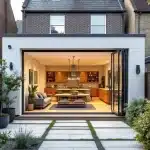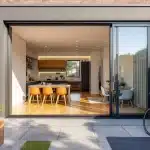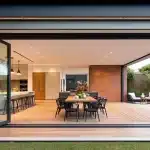How Much Does a House Extension Cost?
Planning a house extension in Melbourne requires careful budget consideration. The cost of adding extension to house varies significantly based on multiple factors.
At Cameron Construction, we’ve helped hundreds of homeowners navigate extension pricing. Understanding these costs upfront prevents budget surprises and helps you make informed decisions about your project.
What Drives Extension Costs Up or Down
Extension costs in Melbourne fluctuate dramatically based on four primary drivers that homeowners often underestimate. The size factor operates on economies of scale – a 50-square-metre ground floor addition typically costs $2,200 to $3,500 per square metre, while smaller 20-square-metre extensions can reach $4,000 per square metre due to fixed setup costs.
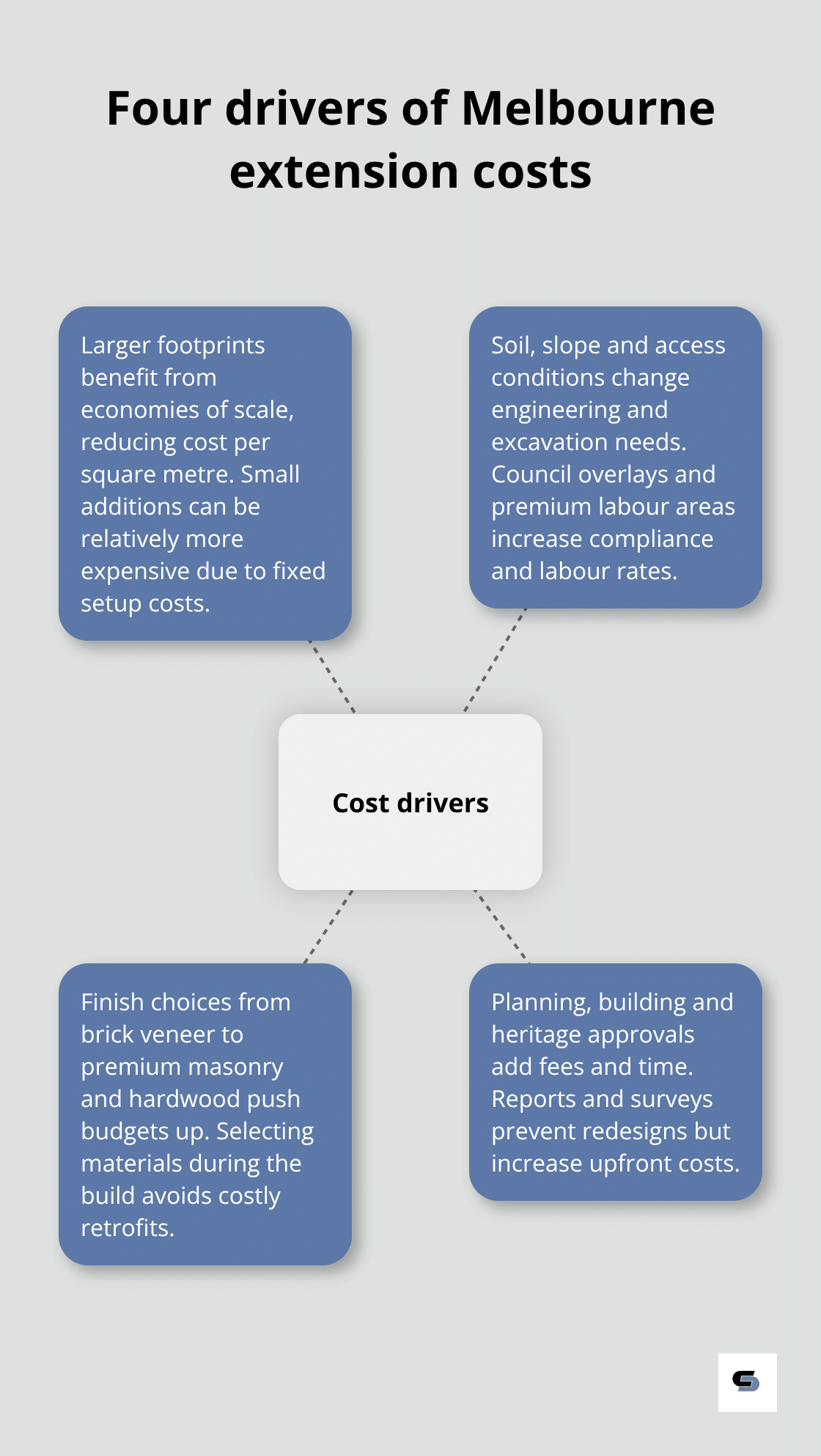
Double storey extensions achieve better value at $2,800 to $4,200 per square metre because structural foundations support multiple levels efficiently.
Location Creates Cost Variations
Melbourne’s geography directly impacts prices through soil conditions and council requirements. Extensions in Camberwell or Toorak face premium labour rates and stricter heritage overlays that add compliance costs. Slopes in suburbs like Mount Waverley require extensive solutions, which increase foundation costs by 40% to 60%. Clay soil areas across Melbourne’s eastern suburbs demand deeper footings and waterproofing systems that add $8,000 to $20,000 to project budgets.
Material Selection Controls Budget Outcomes
Premium finishes separate average extensions from exceptional ones. Standard brick veneer costs $180 to $220 per square metre, while rendered masonry reaches $280 to $350 per square metre. Timber floors range from $120 per square metre for boards to $280 per square metre for solid hardwood. Kitchen renovations within extensions span $25,000 for standard finishes to $80,000 for stone benchtops and European appliances. Smart material choices during construction cost 20% to 30% less than retrofits of premium features later.
Permits Drive Timeline and Costs
Permits for extensions cost $1,200 to $2,800 (based on project value), while plans add $1,500 to $4,000 for complex applications. Council processing times vary significantly – Boroondara Council averages 8 to 12 weeks for approvals, while faster councils complete reviews in 6 to 8 weeks. Structural reports cost $2,500 to $6,000 but prevent costly design changes during construction. Extensions that require heritage assessments face additional $3,000 to $8,000 in consultant fees and extended approval periods.
These cost drivers work together to shape your total investment, but the type of extension you choose creates the foundation for all other expenses.
What Does Each Extension Type Actually Cost
Ground floor additions deliver the most predictable costs in Melbourne’s extension market. Single-storey rear extensions cost $180,000 to $350,000 for 50 to 80 square metres, with brick veneer construction at the lower end and premium finishes that push costs higher. Side returns in terrace houses range from $120,000 to $220,000 for 25 to 40 square metres, which makes them excellent value for inner-city properties. Wraparound extensions that combine rear and side additions cost $280,000 to $480,000 but create dramatic space transformation that justifies the investment.

Ground floor work avoids structural complications of upper levels, which keeps costs to $3,000 to $8,000 for standard soil conditions. Soil reports are required for building permits, with plans needing to account for specific soil conditions at your location.
Double Storey Extensions Maximise Land Use
Double storey extensions cost $320,000 to $650,000 for 80 to 120 square metres across both levels. These projects deliver superior value per square metre compared to single-storey alternatives. The upper level adds bedrooms and bathrooms at $2,800 to $4,200 per square metre, while the ground floor accommodates open-plan areas at similar rates.
Structural requirements increase foundation costs by $15,000 to $25,000, but this investment supports two complete levels. Steel frame construction adds 15% to 20% to material costs but enables larger spans and faster construction. Double storey projects require crane access (which adds $2,500 to $4,000 to budgets), yet the additional floor space typically increases property values by $150,000 to $300,000.
Second Storey Conversions Face Complex Challenges
Second storey conversions cost $220,000 to $420,000 based on structural modifications required. Older Melbourne homes built before 1980 often need complete roof reconstruction, which adds $40,000 to $70,000 to standard conversion costs. Structural engineers charge $4,000 to $12,000 for assessments and designs, as foundations may require reinforcement to support additional loads.
Staircase installation costs $8,000 to $18,000 for timber construction or $15,000 to $30,000 for steel and glass designs. Heritage homes face additional constraints that can increase costs by 30% to 50%, but conversions often represent the only expansion option in established suburbs with limited land.
These extension types each carry distinct cost profiles, but unexpected expenses can significantly impact your final budget regardless of which option you choose.
What Hidden Expenses Will Impact Your Budget
Extension budgets regularly exceed initial estimates by 15% to 25% due to costs that homeowners overlook during planning. Professional design fees represent the largest surprise expense, with structural engineers charging $4,000 to $12,000 for drawings and calculations that councils require for building permits. Architectural plans add another $8,000 to $25,000 for complex extensions, while building surveyors charge $2,500 to $4,500 for permit applications and inspections. These professional fees are non-negotiable requirements that occur before construction begins, yet many homeowners budget only for building costs.
Council Fees and Compliance Costs Add Up Fast
Planning permits cost $1,658 for most Melbourne extensions, with building permits adding another $1,200 to $2,800 based on construction value. Properties within a Heritage Overlay in areas like South Yarra or Prahran require planning permits for buildings with historical significance, while traffic management plans for narrow streets add $1,500 to $3,500. Council inspections during construction cost $400 to $800 per visit, with most extensions requiring four mandatory inspections. Soil reports cost $1,200 to $2,500 but prevent foundation surprises that could add $15,000 to $40,000 in unexpected excavation work.
Temporary Accommodation Creates Major Expenses
Extensions that affect kitchens or bathrooms often force families into temporary accommodation for 8 to 16 weeks. Rental costs average $600 to $1,200 per week in Melbourne (creating $12,000 to $25,000 in additional expenses that many budgets ignore).
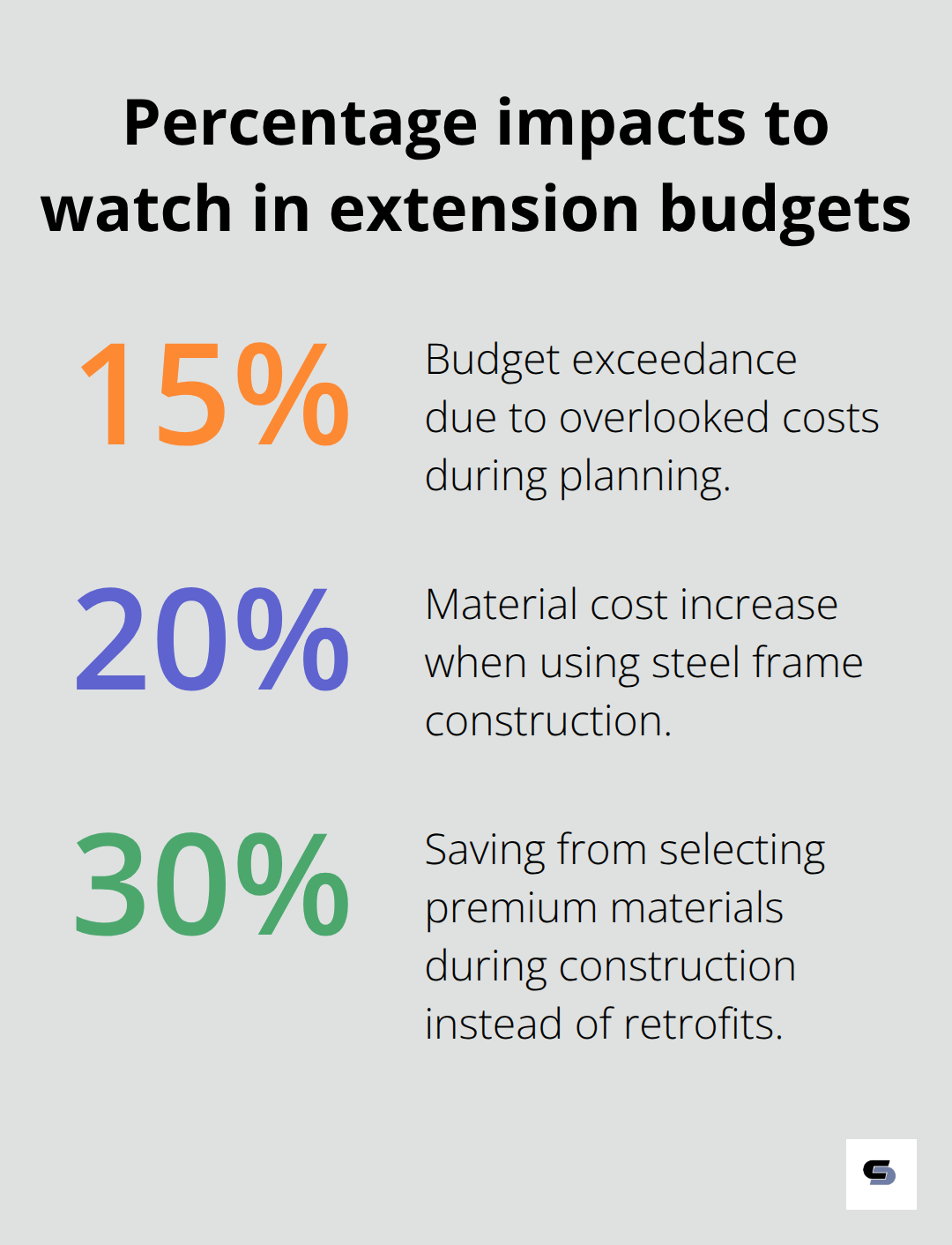
Storage costs for furniture add $200 to $500 monthly, while eating out during kitchen renovations increases food budgets by $300 to $600 weekly for families.
Utility Upgrades Drive Unexpected Costs
Electrical upgrades to support extension loads add $3,000 to $8,000 that occur regardless of extension size. Utility disconnections and reconnections cost $800 to $2,200, while gas line extensions for new kitchens add $1,500 to $3,500. Water pressure upgrades for additional bathrooms cost $2,000 to $5,000 in older Melbourne homes. Older homes often present hidden challenges like outdated wiring or plumbing, which can add unexpected costs to your renovation budget. NBN and telecommunications connections to new areas cost $400 to $1,200 per service (depending on existing infrastructure availability).
Final Thoughts
House extension costs in Melbourne range from $120,000 for small side returns to $650,000 for comprehensive double storey additions. The cost of adding extension to house depends primarily on size, location, materials, and permit requirements. Ground floor extensions deliver predictable prices at $2,200 to $3,500 per square metre, while double storey projects achieve better value through efficient land use.
Hidden expenses regularly add 15% to 25% to initial budgets through professional fees, council permits, temporary accommodation, and utility upgrades. Properties in heritage areas or challenging soil conditions face additional costs that can significantly impact final budgets. Professional consultation prevents costly mistakes and budget overruns (structural engineers, architects, and experienced builders identify potential issues before construction begins).
Accurate quotes require detailed site assessments and clear project specifications. Compare multiple quotes from registered builders who understand Melbourne’s building regulations and council requirements. We at Cameron Construction provide comprehensive project assessments that account for all cost factors specific to your property and requirements.

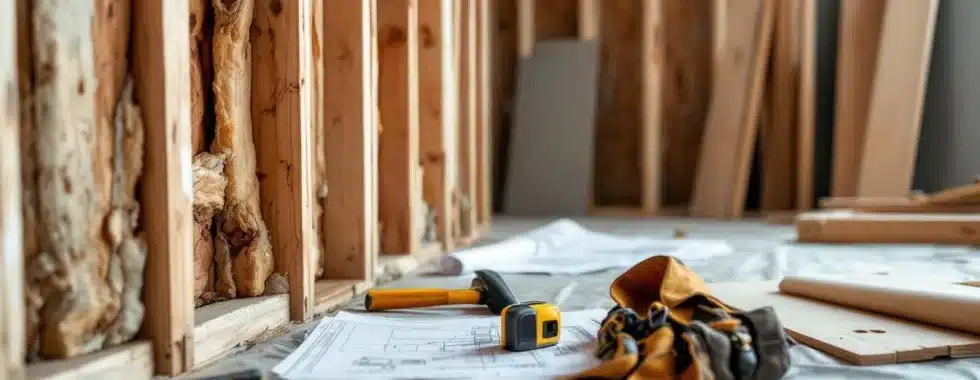
![Second Storey Additions For Growing Families [Guide]](https://www.cameronconstruction.com.au/wp-content/uploads/emplibot/second-storey-additions-hero-1772259809-150x150.webp)

